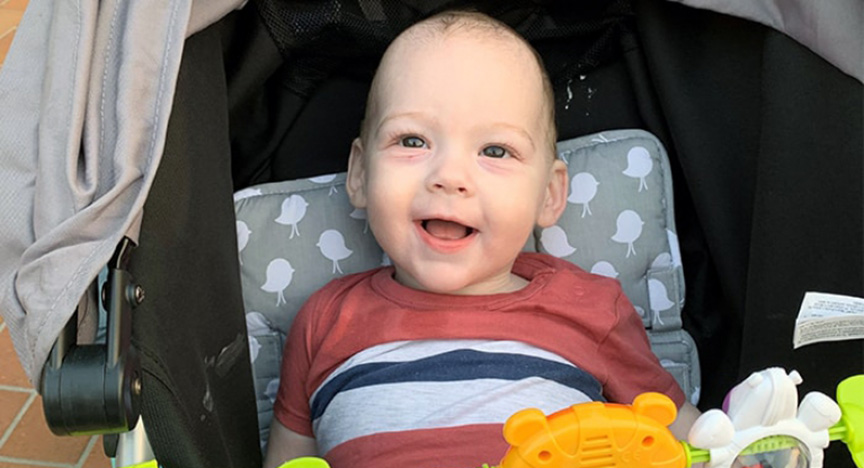
Sixteen-month-old Mason, of Alexandra Hills, was born with Allan-Herndon Dudley syndrome, also known as MCT8 deficiency, a rare condition that causes intellectual disability and problems with movement. The genetic disorder only occurs in boys, and Mason is thought to be one of only 320 males affected by the condition worldwide.
“We became very concerned with Mason’s development when he was around three-and-a-half months,” said Mason’s mum Kate.
“He was not meeting any gross motor milestones, still had poor head control, he was experiencing a lot of digestive issues, and he never seemed to be able to focus on our faces.”
In a bid to get some answers, Kate took Mason to see a paediatrician who sent his test results to Mason’s doctor in the endocrinology department at the Queensland Children’s Hospital for further investigation.
Mason’s thyroid hormone levels, known as triiodothyronine or T3, were extremely high meaning his thyroid was not functioning properly.
“It was then that we started to learn about MCT8 deficiency and what it could mean for our son,” Kate said.
The disorder occurs where there is a defect in the transporter that allows thyroid hormone (T3) to enter the brain, resulting in abnormal brain development that starts before birth. The excess thyroid hormone then moves to the rest of the body causing toxicity in the bloodstream that leads to high metabolism, failure to thrive and muscle wasting.
“My husband and I were in complete shock, we couldn’t believe this was happening to our son. In May 2019, about six weeks later, genetic tests confirmed the diagnosis and it was here that our journey really began.”
Since then, Mason has started medication to help normalise his thyroid hormone levels and improve his general health. It’s hoped the medication may also help to improve his development.
He also has weekly physiotherapy, occupational therapy, and speech therapy sessions at the Queensland Children’s Hospital. Kate hopes he will start music therapy and some additional intensive physio and occupational therapy later this year.
“We are hopeful that he will continue to make progress with early intervention and his therapies.
“Mason is still very delayed with all his milestones, particularly gross motor, but he continues to slowly improve and make gains. We don’t know what the future will hold for Mason, or what his abilities will be, but we are committed to doing whatever it takes to help improve Mason’s quality of life and allow him to live his best life possible.”